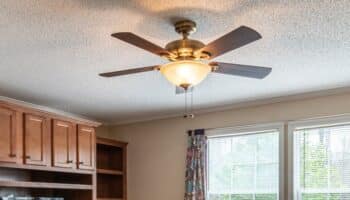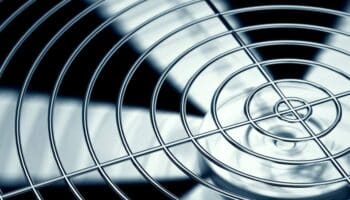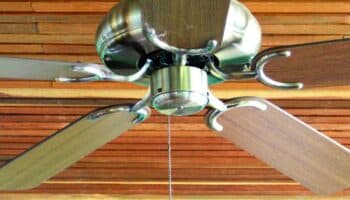We've independently reviewed this article to make sure it's as accurate as we can make it.
To find out more about our article creation and review process, check out our editorial guidelines.
Does your ceiling fan keep beeping at you?
You’re not alone! I know how concerning a ceiling fan beeping sound can be, especially when you don’t know what it means.
Luckily, you’ve come to the right place for answers.
If your ceiling fan keeps beeping, it’s probably indicating normal operation, pairing issues, loose wires, or a faulty power source. A broken capacitor can also explain the beeping sound.
Read on to stop your fan from beeping!
Why Is Your Ceiling Fan Beeping? 6 Simple Explanations
In this section, I’ll guide you through the different reasons that can explain why your ceiling fan keeps beeping and provide various solutions so you can forget all about the sound today.
Are you ready? Let’s dive in!
#1 Normal Operation
If your ceiling fan beeps when turned on, don’t worry. In my experience, a beeping sound is not always necessarily a sign of a malfunction.
Sometimes, the noise is completely normal and part of the ceiling fan’s design. In most models, it’s a way of notifying you that the unit is getting enough power to work and that everything is okay.
The best way to tell that the beeping noise coming from your ceiling fan is, in fact, just a notification of adequate functioning is to listen closely.
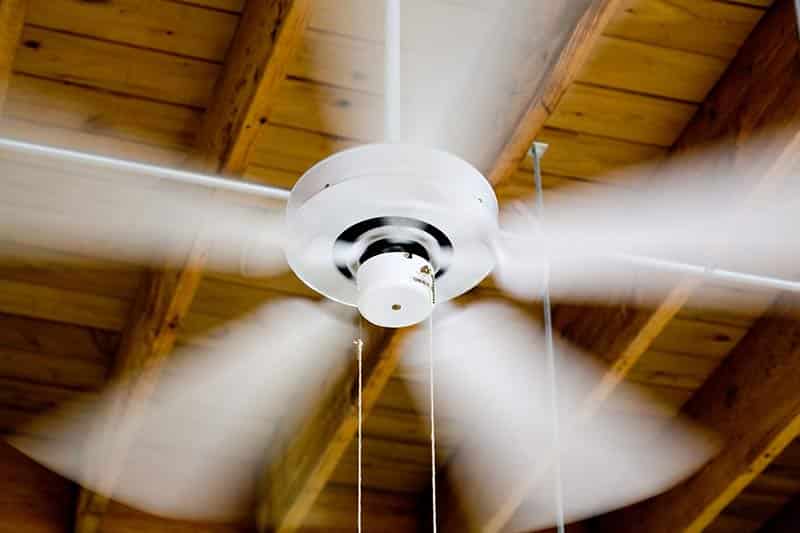
You should only hear one or two beeps every 10 to 30 minutes. If the beeping is more frequent, there’s probably a more complex issue.
Solution: There are some ways to address the beeping sound, but I’d only advise trying them if the sound stems from an actual malfunction. If so, please read on.
#2 Pairing Issues
When I see a ceiling fan that keeps beeping, I always try re-pairing the remote.
If you had your ceiling fan installed by a professional, they likely took care of pairing your remote already. But as time passes, the remote and the appliance can lose communication and need to be paired again.
There are several reasons why the communication between the fan and the remote could have been lost. From a blackout to damage to the remote. You name it, it’s a possibility.
The best way to tell if there’s a pairing issue is by trying to change your fan’s settings remotely. If none of your inputs work, the mystery is solved.
The good news is that pairing your ceiling fan again is not very difficult; the bad news is that it will keep beeping until you do so.
Solution: Read your user manual again. More often than not, you’ll be able to find in there the right process for pairing the remote.
Provided you suspect that the remote is damaged and unable to pair with your ceiling fan, you can search your unit’s make and model to find a replacement.
If you want to get any replacement part – or see how much one would cost – click to enter your model number in the search bar below. Our partners at AppliancePartsPros stock almost every part with free guides on how to install them.

#3 Loose Wires
Does the ceiling fan beeping sound persist? Then, it’s time to inspect the wiring.
If your ceiling fan was installed improperly, some wires could have broken or come loose. In fact, the wiring can wear out as time passes and the ceiling fan operates.
So, if your ceiling fan keeps beeping at you, and you constantly notice that it deactivates and reactivates randomly, chances are a wire is coming into contact with something it shouldn’t.
A loose wire would explain the constant beeping and put your unit at risk of permanent damage due to short-circuiting. In such cases, it is of the utmost importance that you stop using your ceiling fan.
Solution: You’ll have to go in. To do so, please follow these steps:
- Carefully turn off your breakers to interrupt all electrical current to the ceiling fan.
- Remove the light bulbs and their housings.
- Undo the screws in the motor holding the outer metal panel.
- Undo the remaining screws holding the motor to the ceiling, and carefully place it somewhere safe.
- Search the wiring in the hole where the motor goes, and look for anything suspicious.
It goes without saying that if at any point during the process above you feel unsafe or doubtful, you can call a certified electrician to take a look. While we made sure to cut off all electricity going to your fan, it can’t hurt to be extra careful.
#4 A Faulty Power Source
I tend to find that a ceiling fan beeps typically due to a faulty power source.
No matter how well attached your cables are, if the outlet the ceiling fan is connected to is faulty, it could intermittently supply electricity to the appliance, resulting in a beeping sound and random activations and deactivations.
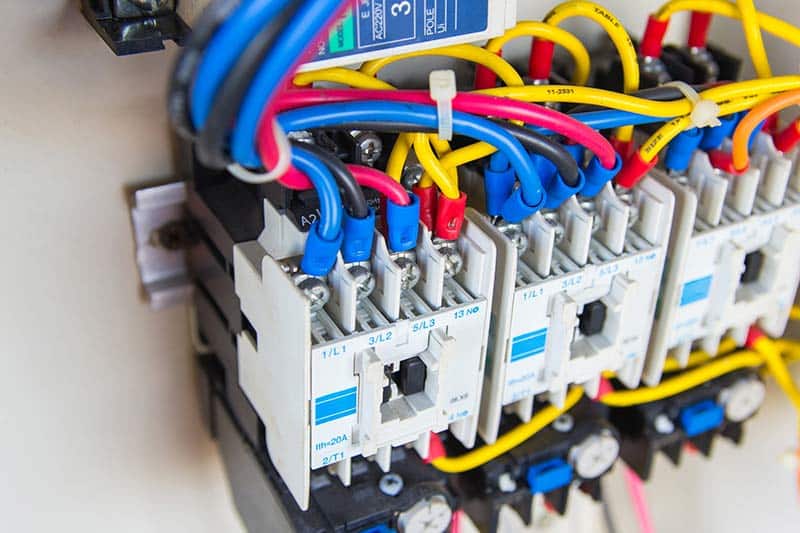
Solution: Please follow the steps from their previous point to gain comfortable access to your wires and test the outlet for continuity with a multimeter.
As you probably know, unlike other external outlets in your home, the one your fan is connected to is not exposed but rather incorporated into your home’s electrical layout.
If the power source is compromised, you’ll have to find another outlet or repair the one you’ve been using all along.
#5 A Broken Capacitor
If your ceiling fan beeps but won’t turn on or randomly deactivates, then the capacitor is probably faulty.
The capacitor is the lifeblood of your ceiling fan. Without it, the motor cannot function, and the blades won’t spin.
So, if your ceiling fan keeps beeping at you and none of the solutions above have worked, you’ll need to inspect the capacitor.
Solution: Please follow the steps from point #3 to gain comfortable access to your capacitor for continuity testing. Replace the capacitor if necessary.
#6 Input Sounds
At this point, you’re probably thinking, “Is there anything my ceiling fan doesn’t need to beep about?”.
I get it; I share your frustration.
Having your ceiling fan beep with every input or fan adjustment you make is nerve-wracking. Luckily, there are some things we can do to make your unit quieter, but they all involve opening the fan’s housing, so tread carefully and make sure you’re not voiding your warranty.
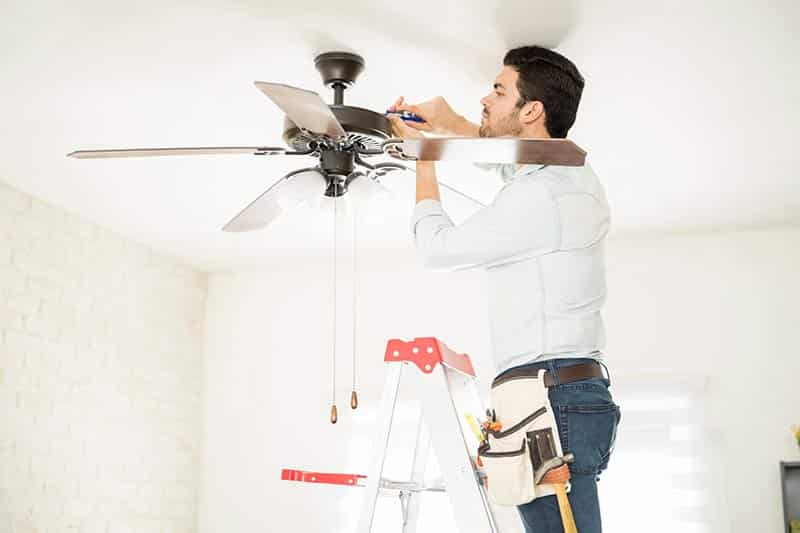
Solution: The process to access your receiver is similar to that of checking your wiring, but there are some slight differences:
- Carefully turn off your breakers to interrupt all electrical current to the ceiling fan.
- Remove the light bulbs and their housings.
- Undo the screws in the motor holding the outer metal panel.
- Undo the remaining screws holding the motor to the ceiling, and carefully place it somewhere safe.
- Locate the remote’s receiver. It should look like a small rectangular box.
- Pry the plastic casing open and expose the receiver’s circuit board.
- Locate the beeping emitter. It should look like a small circle.
- Carefully remove the beeping emitter.
Following the steps above should make your fan quiet once and for all. You’ll never hear another beep again.
I’ve tried to make these steps as detailed as possible, but if you’re a visual person like me, there are tons of online videos you can check out and follow along step by step.
Wrapping Up: Silencing Your Ceiling Fan’s Beeps
Hopefully, now you know how to fix your ceiling fan’s beeping sound.
Remember that if your ceiling fan keeps beeping at you, it typically indicates normal operation, pairing issues, a faulty capacitor, or loose wires. Please re-pair the remote, inspect the wiring, or replace the capacitor if necessary.
Thank you so much for reading. If you found this article helpful, why not keep learning by going through our other incredible resources below?
Enjoy the silence!







